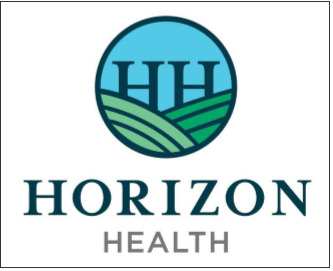Horizon Health (formerly Paris Community Hospital) is a 25-bed critical access hospital located in Paris, Illinois, featuring a rehab surgery department and additional multi-specialty clinics for patients. The healthcare organization has grown immensely over the years, now with six clinics across east central Illinois offering a mix of emergency services and outpatient care to rural communities.
The development of Horizon Health has been informed and shaped by strong community support and involvement since its founding as Paris Community Hospital in 1968. Few know the importance of this inaugural principle better than Elisha Farmer, Horizon Health’s System Administration/Project Manager and Patient Services Manager. Having originally come from a clinical background where she worked with patients directly, she has since transitioned into a leadership role. “I wear a lot of hats,” she says.
When asked which modules or elements of training were most useful, Farmer says each of them had unique relevance. And while the content isn’t specifically geared towards healthcare, the basic grounding principles of what makes a good customer service interaction transcend barriers between industries. Perhaps most importantly, investing in ServiceSkills training both consciously and subconsciously reiterated to everyone involved at Horizon Health that the organization values customer service. And when working in a field where many offerings between institutions are similar, this can determine where a patient chooses to receive care. Farmer has witnessed firsthand how this investment in customer service has resulted in a better experience for vulnerable patients, who trust the practitioners tasked with their care.
The Need for Exceptional Customer Service Training in Healthcare:
Horizon Health originally became acquainted with ServiceSkills while searching for a customer service training program that would not only help employees learn the finer points of bedside manner, but provide some quantifiable data in the process.
“Our most pressing need was to find some type of customer service training for our employees that also offered measurable goals, which we could use to create some accountability,” says Farmer.
It became clear that just a one-off presentation or lunch-and-learn would not fulfill the need at hand. Rather, Farmer recognized that the company needed employee access to ongoing curriculum that could function alongside multiple in-person presentations, with learning modules that could be easily integrated into their workflow.
She notes that while the in-person seminars, workshops and follow-up educational sessions can be useful, it was the additional online training that set ServiceSkills apart from other programs she’d been considering. With the simple training tools that allow managers to track their teams’ progress and double-check who has completed what successfully, rolling out the curriculum to the full Horizon Health workforce was a no-brainer.
Fully Implementing ServiceSkills:
Horizon Health has since purchased licensing of ServiceSkills technology for all 550 of their employees, from hospital administrators to physicians. Every single one is required by the company’s CEO to complete the training modules. To kick off the program, Horizon Health had our keynote speaker, Nancy Friedman, deliver an onsite presentation, attended by 375 employees. Friedman has been working in the field of customer service training for decades, and also developed the curriculum covered in each training module.
“We’d never really done anything quite like that before,” says Farmer, of hearing Friedman’s in-person presentation. “Our employees were all very engaged and excited to learn. It went so well that we asked her to come again to keep the momentum going.”
Farmer re-emphasizes that it was ultimately the combination of having an in-person presentation and online modules, the latter of which can be streamed anywhere with an internet connection, that made the ServiceSkills approach the most impactful. She observed employees beginning to draw connections between the presentations and modules, and how this newly-acquired knowledge was reflected in their interactions with patients. As healthcare practitioners know only too well, it is particularly imperative that patients receive exemplary customer service in this field.
“When people come in to see us, it’s because something’s wrong. They don’t want to be there. Nobody wants to go to a hospital or a clinic—they’re not shopping or dining,” says Farmer. “So it’s especially important that they’re treated well. They need to see friendly faces and have kind interactions with our staff. That helps set the stage for the best overall care.”
The Impact:
Now that the initial customer service training crash course has been completed, Horizon Health leaders now assign one module to staff members every six weeks to keep their skills sharp. The technology allows managers to track employee progress, and they’re also able to report when their teams have completed training. Maintaining these key customer services tips and refreshers consistently creates the largest impact on transforming a team’s skills. Further, the training program provides company leaders with information that can have multiple applications.
“What we’re able to gather from our employees through ServiceSkills is incredibly valuable: we can say to our board and stakeholders that Horizon Health employees are deeply invested in providing exceptional customer service to patients,” says Farmer. “And we can back that up with real data.”
